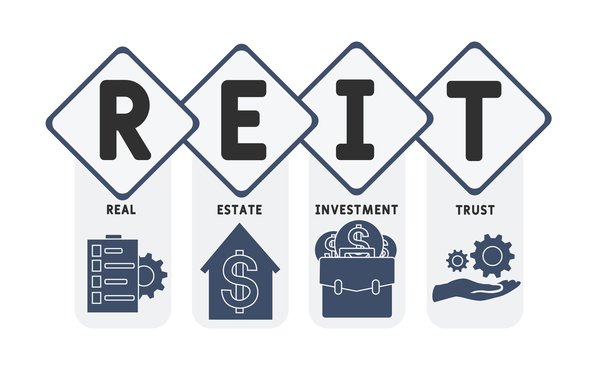Data center REITs operate crucial data infrastructure. They own and manage facilities that customers use to house servers and networking equipment to store and access data. With data usage growing, demand for these facilities continues to expand.
Here's a closer look at data center REITs and why investors might want to consider the sector.

Understanding data center REITs
Understanding data center REITs
A data center is a specially designed facility consisting of the building shell, electrical systems, heating, ventilation and air conditioning (HVAC) and mechanical systems, and other commercial space. Data centers feature highly secure and redundant equipment. They aim to provide customers with uninterrupted access to their data at any time.
Like most other real estate investment trusts (REITs), data center REITs rent space in their facilities to tenants. They typically rent space to multiple customers, as in co-location, but can rent the entire facility to one tenant, as in enterprise or hyperscale. The tenants use this space to house their networking equipment and servers, allowing them to process and store data.
In addition to renting space, data center REITs provide several other specialized services to their customers, including highly reliable power, a regulated temperature, and physical building security. Data center REITs also provide interconnection services to their clients, meaning a physical network connection between two parties.
Advantages of investing in data center REITs
Advantages of investing in data center REITs
Data center REITs allow investors to benefit from the growth in data usage. According to IDC, data usage is on track to grow at a 24% compound annual rate through 2025. That should drive the need for additional infrastructure to transmit and store data, including more data center capacity.
Another benefit of data center REITs is that they tend to be relatively recession-proof. That's because most tenants sign long-term contracts for space in a data center, allowing data center REITs to generate recurring revenue.
Risks of investing in data center REITs
Risks of investing in data center REITs
Data center REITs are less risky than many other real estate investments and technology stocks. However, they aren't without risk. Here's a look at some of the factors that can affect these REITs:
- Interest rate risk: Rising interest rates affect all REITs because REITs tend to borrow a lot of money to expand. As rates rise, borrowing costs can increase. In addition, rising rates make lower-risk, yield-focused investments, such as bonds, more attractive. That often weighs on REIT stock prices to push up their dividend yields and compensate investors for their higher risk.
Interest Rate
- Oversupply risk: Data center operators often build new capacity on speculation. If they build too many data centers, the surplus can affect occupancy levels and rental rates.
- Environmental risks: Data centers use a significant amount of energy and water to keep servers and networking equipment running and cool. Because of that, they face environmental risks from climate change, storms, and droughts that can affect a data center's ability to deliver 100% uptime.
Two data center REITs to consider in 2023
Two data center REITs to consider in 2023
According to the national association of real estate investment trusts (Nareit), as of May 2023, only two REITs exist that are small-caps or higher, and they primarily focus on owning and operating data centers. Here's a closer look at these players:
| Data Center REIT | Ticker | Market Cap | Description |
|---|---|---|---|
| Digital Realty | (NYSE:DLR) | $27.464 billion | A data center REIT with over 300 facilities in over 50 metros on six continents. |
| Equinix | (NASDAQ:EQIX) | $66.145 billion | A data center REIT with more than 248 data centers in more than 71 metros in 32 countries. |
1. Digital Realty
1. Digital Realty
Digital Realty is one of the largest data center operators in the world. In addition to renting space in its facilities to companies to store their networking and storage equipment, Digital Realty also leases entire data center shells to other operators, including fellow data center REIT Equinix.
Digital Realty has delivered excellent results for investors over the years. It has spent billions of dollars buying data centers to complement its organic growth. Those two growth drivers helped the data center REIT expand its core funds from operations (FFO) at an 11% compound annual growth rate since 2005. That helped support 10% compound annual dividend growth during that time.
The REIT has a strong financial profile, including an investment-grade credit rating and conservative dividend payout ratio. Those features give it the flexibility to continue growing in the future.
2. Equinix
2. Equinix
Equinix is one of the world's largest digital infrastructure companies. It has more than 10,000 customers and 452,000 total interconnections on its systems.
Equinix also has an excellent growth track record. As of 2023's first quarter, the data center REIT had increased its revenue in over 80 straight quarters, which the company claims is the longest track record of any company in the S&P 500. One factor driving its steady growth is its high-recurring-revenue business model. On top of that, the REIT has a knack for steadily expanding its operations through ground-up developments and acquisitions. That's allowed it to create significant shareholder value.
Revenue
Like Digital Realty, Equinix has an excellent financial profile. That gives it ample financial flexibility to continue expanding its data center portfolio.
Related investing topics
Data-powered growth
Data-powered growth
Data center REITs have benefited from the explosive growth in data usage over the years. This catalyst has allowed these REITs to expand their portfolios, driving fast-paced revenue, earnings, and dividend growth. Those upward trends aren't showing any signs of stopping, given the current projections for data growth in the coming years. Consequently, investors should take a closer look at data center REITs.



































